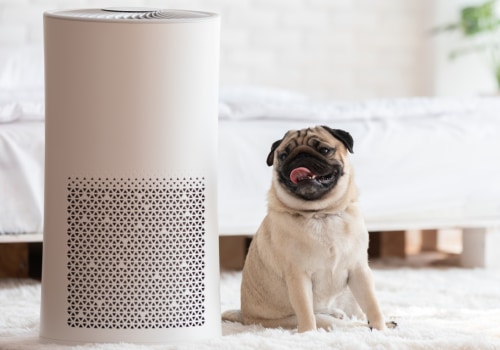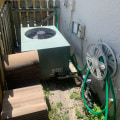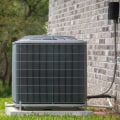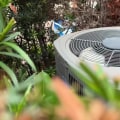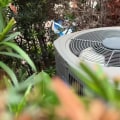How Long Can You Run Your AC Without a Filter?
Did you know that running your AC without a filter can impact its efficiency, not to mention your health? Filters are vital as they trap airborne particles, maintaining cleanliness in your AC system which allows it to run smoothly.
With no filter in place, your AC needs to exert more effort, which increases energy consumption and causes your power bills to rise. That's not all – expect more dust-clogged repairs too.
Now, about air quality. Can you imagine allergens, bacteria, and harmful pathogens circulating freely in your living space? Without a filter, that's exactly what happens, putting you at risk for serious health issues.
So, using filters correctly becomes important not only for your AC's performance but also for your well-being. Let's get into more details so you can fully grasp why AC filters are so important.
Key Takeaways
• Cooling air through a refrigeration cycle is how AC systems work, with SEER ratings indicating their efficiency.
• Essential for operation, filters in the AC trap particles while enhancing energy efficiency.
• Dust will pile up, efficiency drops and maintenance needs rise when you run an AC system without a filter.
• Allergies and asthma conditions could worsen in the absence of an AC filter as allergens, dust, and microbes get circulated.
• For efficient AC operation, regular maintenance such as replacing filters and cleaning coils is crucial.
How Basic AC Operations Works
To comprehend the workings of your AC system, begin with the basics. This appliance uses a refrigeration cycle to cool your surroundings. The heat from indoor air gets absorbed by the refrigerant, which then releases this heat outside.
AC systems come in two primary types: central and mini-split, or ductless. Whole-house cooling is provided by central AC systems, while mini-split units focus on individual rooms or zones in your dwelling. Selection depends on your specific cooling requirements and your home's layout.
Efficiency in energy use is an important factor. Modern AC units aim to save energy, which leads to lower power bills and a smaller environmental impact. Seasonal Energy Efficiency Ratio (SEER) measures an AC system's efficiency. Units with higher SEER ratings deliver greater efficiency.
The Fundamental Role of AC Filters
AC filters are the main reason for the high efficiency of your cooling system. These prerequisite elements are responsible for the removal of airborne particles like dust and dirt, thus, ensuring that only the purified air circulates in your living space.
Filters come in varied types, with classification mainly based on material composition and filtration capacity. Fiberglass filters, commonly used, offer basic particle filtration. In contrast, pleated filters provide superior filtration, ideal for homes housing individuals with allergies or respiratory ailments.
Your filter choice directly influences the energy efficiency of the cooling system. Overworked AC units, due to obstructed or ill-suited filters, consume more energy. Conversely, well-maintained, suitable filters promote smooth AC operation, leading to energy conservation.
Consequences of Removing the AC Filter
Recognizing the significance of AC filters is essential, but at the same time, you should also be aware of the consequences of using an AC unit without one. The absence of a filter implies that your AC has to work harder, thus, a considerable reduction in energy efficiency.
Filters are used to catch airborne particles and their absence makes these pile up in the system which may lead to damage and thus the performance will be affected. A system filled with dust requires more frequent maintenance, costing you both time and money.
Operating your AC without a filter also negatively impacts energy efficiency. With a clogged system, more energy is needed to cool your home. Picture trying to complete a marathon while breathing through a straw - that's how your AC feels. This extra energy consumption will show up on your monthly bills.
Risks to Health and Air Quality
Running an AC unit without a filter not only harms the unit but also contributes to potential health risks and degradation of indoor air quality. This might seem insignificant, but in reality, it's a major issue warranting attention.
• Allergen Concentration Rise: Filters in AC systems trap allergens and even pet dander. Without one, these substances freely circulate in your home, which may worsen allergies and asthma conditions.
• Circulation of Airborne Pathogens: Pathogens like bacteria and viruses travel through the air. A cooling system lacking a filter could distribute these harmful microscopic organisms all over your home.
• Deteriorating Air Quality: The absence of a filter means particulates aren't removed, leading to rapid degradation of indoor air quality. More dust will be observed settling on surfaces, or you may notice stale odors pervading the air.
• Health Consequences: Over time, breathing poor-quality air could lead to severe health problems such as chronic allergies and respiratory diseases.
Proper AC Maintenance and Usage
Proper upkeep of your AC unit alongside smart usage can prolong its service life, providing cleaner, healthier air at home. Regular cleaning, filter replacements, leak inspections, and seasonal maintenance are critical aspects of AC maintenance.
Upon spring's arrival, prepare for the hot months by doing seasonal maintenance. This includes coil cleaning, coolant level checking, and thermostat function verification. Remember, an AC unit in good condition leads to energy efficiency.
Proper usage of your AC isn't merely cranking up the temperature when it gets hot. Consider maintaining a comfortable but slightly higher setting on your thermostat and utilizing fans to distribute the cool air. Such practices help enhance energy efficiency, reducing your power bills.
When not in use or during extended absences from home, ensure to switch off your AC. This habit significantly reduces power consumption, aids in environmental sustainability, and prolongs your AC's service life.
In essence, diligent maintenance combined with intelligent usage of your AC unit can result in a more durable, efficient system.
Frequently Asked Questions
What Is the Average Lifespan of a Typical AC Unit?
The average lifespan of AC units can vary greatly, with multiple factors playing important roles. Regular upkeep can notably extend this period. Negligence, on the other hand, might result in a shorter lifespan, typically around 10-15 years. With meticulous maintenance, AC units can function efficiently for two decades or even longer.
Can an Air Conditioner Work as a Dehumidifier?
Indeed, air conditioners double as dehumidifiers. During the process of cooling your living space, they also extract excess moisture, regulating humidity. This dual function provides both a cooler and less humid environment for your comfort.
Does Using an AC Unit Increase My Carbon Footprint?
Your carbon footprint sees an increase with AC unit usage. This increase has ties to carbon taxation. Fossil fuels burn during its operation unless you power this unit with renewable energy sources. Eco-friendliness is not a characteristic of ACs.
Are There Any Energy-Efficient Alternatives to Traditional AC Units?
Traditional AC units have energy-efficient alternatives worth considering. Geothermal cooling systems represent one such option, being both eco-friendly and effective in reducing carbon footprints. Passive ventilation serves as another great alternative, offering similar benefits.
Can Smart Thermostats Help Improve the Efficiency of an AC Unit?
Yes, tailoring energy use to coincide with your routine, these devices reduce unnecessary power consumption. They offer a clever solution to energy conservation, helping you decrease your electricity expenses.
Here is the nearest branch location serving the Miami FL area…
Filterbuy HVAC Solutions - Miami FL
1300 S Miami Ave Unit 4806, Miami, FL 33130
(305) 306-5027
https://maps.app.goo.gl/XDTMcEGZ1vdktKqJ6
Here are driving directions to the nearest branch location serving Miami…
